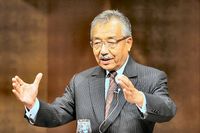


Toshio Matsuda, Commentator & Intl Economist
Straight from the Shoulder
Official Website : http://www.chokugen.com/e/
E-mail : masuda@sunraworld.com
FAX: 011 81 3 5965-0064
BackNumber is HERE!
gBlack ThursdayhJanuary 18 (Bank of Japan Policy Board Meeting Results Announced)
The economy doesn't work like the military. The strong do not always stay strong, while the leadership of the world economy is in a constant state of flux. Of late, the economies of developed countries other than Japan have reached conditions akin to those of the Japanese economy in the latter half of the 1980s. For 10 years in the world economy, intensified international competition driven by oversupply has held down trade commodity prices, impacting consumer prices and resulting in generally low inflation and interest rates in developed countries. On the other hand, excessive global liquidity has flowed into the commodity markets, triggering a jump in raw materials prices and pushing up asset prices ? especially those of stocks and real estate. Soaring prices under low inflation is a situation analogous to that which existed on the eve of Japan's economy bubble around 1998.
The slightly overheated boom in the U.S. economy has been adjusted with the moderate drop in housing prices, with no need to either raise or lower interest rates and growth in the GDP continuing at the level of three to four percent. Monetary policy remains constant, and I cannot find any immediate risk for the U.S. economy as it hums along in a proper state of prosperity. As a natural outgrowth of these conditions, U.S. stock prices continue to climb to new record highs. However, it is exactly this "almost too good to be true" state of the U.S. economy that lends itself to the emergence of "vague uncertainties."
The U.S. economy is currently in a state of "feeling around for its bearings." At the start of the 1990s the Japanese economy plunged into unprecedented bubble conditions, with that period also characterized by the blunder of the "feeling around" approach of then-Bank of Japan Governor Yasushi Mieno. At this point in time, there is no real point in explaining the details of how this came to pass. At present, the attention of the developed countries is being not directed toward Chair Ben Bernanke of the Board of Governors of the Federal Reserve System. Rather, it is focused on BOJ Governor Toshihiko Fukui. This is because only BOJ has the past experience of failing miserably in its steering the country through the great bubble of the 20th century. Today, the developed countries find themselves in the midst of the same type of "vague uncertainties" that existed on the eve of the bubble. Under these circumstances, it makes perfect sense for the world to be keeping a close watch on the next move to be made by BOJ.
I wonder, however, if such awareness exists within BOJ itself? Right now it is tough for the central bank to deny the view that its decision not to raise interest rates at the January 18 Policy Board meeting was due to buckling under to political pressure. BOJ has lost the market's trust, with private sector capital flowing to the high interest rates in the U.S. and international funds increasing their borrowing of yen through the carry trade. As a result, the yen has become cheaper than any other international currency. As of January 18, the foreign exchange market, addressing "the possibility of a rate cut in the U.S. and the possibility for a rate hike in Japan," was in a "high-yen, low-dollar" trend. Prompted by a higher yen, furthermore, Japan's export companies were searching for means to lower their dependence on foreign demand and expand domestic demand. If the Japanese economy made the transition away from dependence on foreign demand to favor domestic demand, it would also move away from the brand of prosperity to date in which the general public feels it has no stake in, toward high economic times truly appreciated by the people. When the Japanese economy changes to dependency on domestic demand and the U.S. economy moves to dependence on foreign demand, the leadership in the world economy will swing to Japan.
January 18, therefore, was the day of the critically important turning point for the hopes of the world and structural readjustment of the Japanese economy. Beyond that, it presaged a shift in the reins of leadership in the world economy to Japan. For BOJ, regaining the trust of the market that it lost on this day will be no simple task. The weak yen and the sluggish state of Japanese stock prices are all the responsibility of BOJ Governor Fukui. "BOJ independence" means stressing the importance of "dialogue with the market" and not the government in power at the time. At present, the reasons for a potential rate hike in February are gradually fading from the scene, dragged down by fundamentals. Raising rates would be illogical, while not hiking them would lose the market's trust. Governor Fukui, who has personally created a situation in which he and BOJ are under attack from all sides, has proved that in terms of being a "lightweight" he by no means takes a backseat to former Governor Mieno.
Anyone wanting to redistribute Straight from the Shoulder pieces or excerpts from the texts should direct their request in advance to the Toshio Matsuda Office at Sunraworld, Ltd. (Tel: 81-(0)3-3955-2121).
BackNumber is Here!